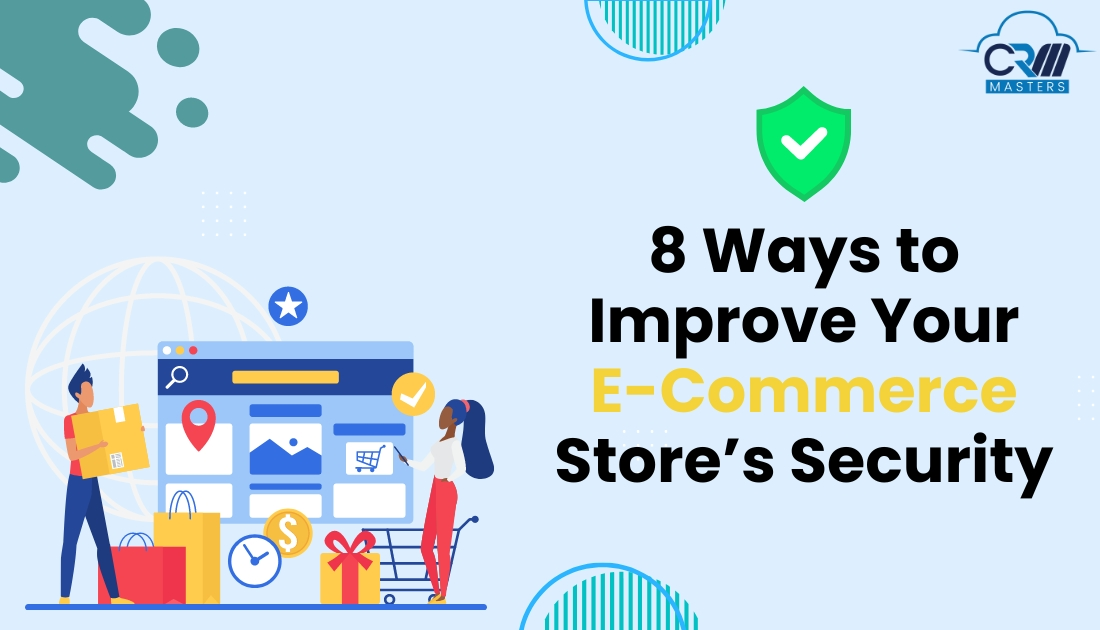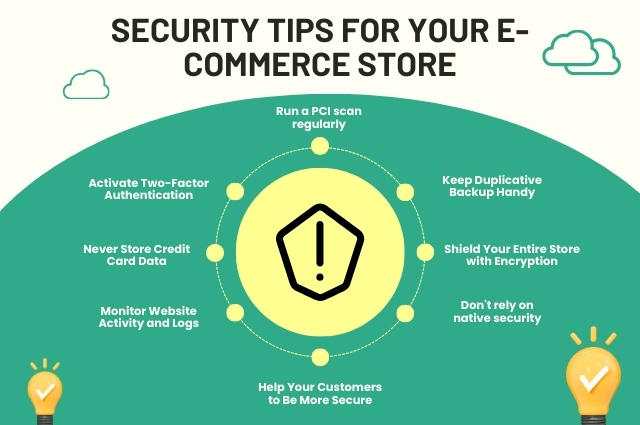
8 Ways to Improve Your E-Commerce Store’s Security
Maintaining security is one thing that cannot be overlooked in the world of e-commerce. With the increasing number of cyber threats and data breaches, protecting your online store and your customers’ sensitive information should be a top priority.
Strengthening your e-commerce store’s security not only safeguards your business but also builds trust with your customers, ultimately leading to improved sales and brand reputation.
In this blog, we’ll explore effective ways to enhance your e-commerce store’s security and how can a Shopify Development Company help you with this.
8 Security Tips for Your E-Commerce Store

1) Activate Two-Factor Authentication
Traditional authentication systems often fall short in the face of increasingly advanced attacks. Two-factor authentication (2FA) offers a powerful solution by introducing an additional layer of security beyond the standard username and password combination.
2FA reduces the risk of unauthorized access even if a user’s credentials are compromised by requiring them to prove their identity via a secondary authentication method, such as a one-time SMS code.
Empower your e-commerce store with 2FA to strengthen its defenses against credential theft, phishing attacks, and other malicious activities, enhancing both security and user trust in the process.
2) Shield Your Entire Store with Encryption
You must ensure that your e-commerce store’s data is secure against interception and unauthorized access against such threats, ensuring that sensitive information remains protected from malicious activities.
You can safeguard sensitive information, such as customer credentials and payment details, by encrypting your entire e-commerce infrastructure, including communication channels and stored data.
To create a sense of confidence among customers and stakeholders regarding the integrity of their data, implementing Secure Socket Layer (SSL) encryption for data transmission and utilizing robust encryption algorithms for data-at-rest protection are important components of this comprehensive security strategy.
SSL is currently being used by platforms like Shopify on all of their customer sites, including individual pages.
3) Don’t rely on Native Security
Adding other plugins to strengthen security may be necessary, depending on the platform you use. Even though Magento and WooCommerce offer simple eCommerce setups, their native security isn’t necessarily the greatest.
If your content management system (CMS) is built on WordPress or WooCommerce, search for highly-rated security plugins to cover the security holes left by the lack of native security.
Although platforms like Shopify are generally safer, you can still strengthen that protection with security plugins.
4) Help Your Customers to Be More Secure
While the security of your customers is generally out of your control, it is not in your hands how they protect themselves but you can always take extra security steps for your customers as a business.
In this case, two-factor authentication can help, you can offer your customers help in keeping their accounts safe. Encourage the use of complex passwords containing a combination of letters, numbers, and special characters.
Additionally, prompt users to change their passwords regularly and avoid reusing passwords across multiple accounts to minimize the risk of credential stuffing attacks.
5) Monitor Website Activity and Logs
Implement robust logging and monitoring solutions to track website activity, detect suspicious behavior, and respond to security incidents on time. Monitor access logs, error logs, and system logs for unusual patterns or unauthorized access attempts.
Set up alerts and notifications to notify administrators of potential security breaches or abnormal activity, allowing them to take immediate action to mitigate risks.
Set up alerts based on many variables if your payment processor allows it. These might consist of:
- Orders come from foreign IP addresses.
- Mismatched billing and card data.
- Several orders were made using the same credit card.
- The same individual places multiple orders with separate cards.
- Shipping and invoicing details that don’t match.
6) Keep Duplicative Backup Handy
Experiencing data breaches can be really frustrating and can cause further harm to your digital infrastructure. Hackers may even purposefully remove or delete data in specific circumstances which can adversely affect your personal information.
That is why keeping duplicative backups isn’t just a precaution; it’s a necessary component of a complete security strategy for your e-commerce store.
To reduce these risks, it’s important to maintain duplicate backups of your e-commerce store’s data. By regularly keeping duplicate backups, you can significantly reduce the harm caused by hackers and any ensuing data loss.
You can restore from your most recent backup and concentrate on getting back to work while enhancing security once the breach has been fixed.
7) Never Store Credit Card Data
To ensure compliance with PCI (Payment Card Industry) standards, most modern eCommerce platforms refrain from storing credit card information, relying instead on trusted external payment processors for transactions.
However, some brands offer options for offline credit processing, which involves storing sensitive data. Storing customer and credit card data exposes both you and your customers to potential breaches and fraud.
It is crucial never to store such information in any form. To enhance security measures, consider pursuing Payment Card Industry Data Security Standard (PCI DSS) accreditation.
This involves undergoing an audit to ensure compliance with various standards, including:
- Maintaining a secure network.
- Protecting cardholder data.
- Implementing a vulnerability management program.
- Enforcing access control measures.
- Conducting regular network inspections.
- Having an information security policy in place.
8) Run a PCI Scan Regularly.
By using Proactive Security Inspection (PCI), you can find issues before they cost you money and clients. No matter how well-known the host is for your eCommerce website, you should nevertheless perform regular PCI scans.
These scans identify threats and weaknesses that may expose your online store to malware and virus attacks, as well as data breaches.
Need a Trusted Shopify Design and Development Company?
Protecting your e-commerce store’s security is important in today’s digital landscape. By implementing these 8 security tips, you can significantly reduce the risk of cyber threats and data breaches, thereby protecting your business and promoting trust with your customers.
For expert assistance in strengthening your e-commerce store’s security, consider reaching out to CRM Masters, with experienced Shopify developers we can provide customized solutions to meet your specific needs and ensure peace of mind for you and your customers.
Get your brand online and set up an online sales front with CRM Master’s Infotech.












